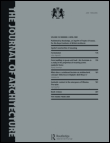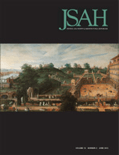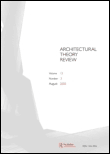
ARCHITECTURAL HISTORY
Scope & Guideline
Unveiling the Stories Behind Structures
Introduction
Aims and Scopes
- Historical Analysis of Architectural Movements:
The journal focuses on various architectural styles and movements, analyzing their historical significance and the cultural contexts that shaped them. - Interdisciplinary Approaches:
It integrates methodologies from art history, sociology, and cultural studies, encouraging a multidisciplinary perspective on architectural history. - Regional and Global Perspectives:
The journal not only covers Western architecture but also emphasizes non-Western architectural practices and their histories, fostering a more inclusive discourse. - Social and Political Dimensions:
It investigates the relationship between architecture and power dynamics, exploring how built environments reflect and influence societal structures. - Gender and Diversity in Architecture:
The journal highlights contributions from diverse voices, particularly focusing on gender and underrepresented groups within architectural history.
Trending and Emerging
- Sustainability and Environmental Concerns:
There is an increasing focus on sustainability in architectural practices, emphasizing the historical context of environmental considerations in design. - Architecture and Identity:
Emerging themes explore the intersections of architecture with identity, race, and cultural representation, particularly in relation to marginalized communities. - Digital Humanities in Architectural Research:
The integration of digital tools and methodologies in architectural research is gaining prominence, allowing for new ways of visualizing and analyzing historical data. - Architecture in Conflict and Post-Conflict Contexts:
Research is increasingly addressing the role of architecture in conflict zones, examining how built environments influence and are influenced by socio-political turmoil. - Public Engagement and Community Involvement:
There is a growing emphasis on how architectural history engages with public memory and community narratives, fostering a participatory approach to architecture.
Declining or Waning
- Traditional Architectural Histories:
There is a noticeable decline in papers solely focused on traditional architectural histories without critical engagement with contemporary issues or interdisciplinary approaches. - Eurocentric Narratives:
The journal is moving away from predominantly Eurocentric narratives, as there is a growing emphasis on global perspectives and inclusivity in architectural discourse. - Static Theoretical Frameworks:
The reliance on static or outdated theoretical frameworks in architectural analysis is waning, with a shift towards more dynamic and contemporary methodologies. - Biographical Studies of Architects:
Fewer papers are dedicated to biographical studies of individual architects in isolation, as the focus shifts to broader contextual analyses that include socio-political influences.
Similar Journals

Studies in History and Theory of Architecture-Studii de Istoria si Teoria Arhitecturii
Cultivating Innovative Perspectives in Architectural StudiesStudies in History and Theory of Architecture - Studii de Istoria si Teoria Arhitecturii, published by EDITURA UNIV ION MINCU in Romania, serves as a crucial platform for scholarly dialogue in the interdisciplinary fields of architecture, conservation, and urban studies. With an ISSN of 2344-6544 and E-ISSN 2457-1687, this open-access journal has been disseminating valuable research outputs since 2014, facilitating global access to knowledge. Although it currently holds a Q4 quartile ranking in multiple categories, including Conservation and Urban Studies, the journal aims to elevate discussions surrounding architectural theory and history, safety, risk, and reliability in built environments. Positioned at the intersection of arts and humanities, the journal encourages contributions that challenge conventional paradigms and enrich academic discourse. As a vital resource for researchers, professionals, and students alike, Studii de Istoria si Teoria Arhitecturii is dedicated to nurturing the growth of architectural knowledge and its practical applications in contemporary society.

Journal of Architecture
Advancing the discourse of design and innovation.Journal of Architecture, published by ROUTLEDGE JOURNALS, TAYLOR & FRANCIS LTD, stands as a pivotal platform for scholarly discourse in the ever-evolving field of architecture. Established in 1996, this esteemed journal boasts an impressive impact factor, categorized as Q2 in Architecture and Q1 in Visual Arts and Performing Arts, reflecting its significant contribution to both disciplines. With a robust Scopus ranking positioning it in the 85th percentile among Visual Arts and Performing Arts and the 57th percentile within Engineering Architecture, the journal serves as an essential resource for researchers, professionals, and students alike. The Journal of Architecture features innovative research and thoughtful analysis that shape contemporary architectural practices and theories, encouraging interdisciplinary dialogue. Engaging with this journal allows readers to stay abreast of critical advancements and emerging trends, fostering a deeper understanding of architecture's role in societal transformation.

Cuaderno de Notas
Fostering Interdisciplinary Dialogue in Arts and HumanitiesCuaderno de Notas is a dedicated journal that serves as a platform for scholarly discourse within the realm of arts and humanities, published by UNIV POLITECNICA MADRID, ESCUELA TEC SUP ARQUIT, DEPT COMPOSICION ARQUITECT. With an ISSN of 1138-1590 and an E-ISSN of 2386-8376, this open-access journal has been committed to free dissemination of knowledge since 2009. As of 2023, it holds a Q4 ranking in the arts and humanities category, reflecting its emerging presence in the academic community with a Scopus rank of #483/552 and a 12th percentile standing. Cuaderno de Notas aims to foster interdisciplinary research and creative expression, making it an essential resource for researchers, artists, and students seeking to engage with contemporary issues in the arts and humanities. Its base in Madrid, Spain, positions the journal at the cultural crossroad of European and global artistic innovation, ensuring its contributions are both timely and relevant.

ArcHistoR-Architecture History Restoration
Preserving Heritage, Inspiring InnovationArcHistoR-Architecture History Restoration is an esteemed open-access journal published by UNIV MEDITERRANEA REGGIO CALABRIA since 2014, focused on the multifaceted domains of architecture, history, and visual arts. This journal serves as a vital platform for the dissemination of research findings, innovative methodologies, and critical discussions surrounding the restoration and history of architectural practices, appealing to a diverse audience of researchers, professionals, and students in these fields. With a commitment to scholarly excellence, ArcHistoR has positioned itself within the academic community, reflected in its ranking in the 2023 category quartiles, where it secured Q4 in Architecture and Q3 in both History and Visual Arts and Performing Arts. The journal facilitates global collaboration and knowledge sharing in its areas of expertise, further underscoring its relevance and significance. Based in Italy, effective communication and cooperation in the restoration community can flourish through the journal's purview. For those dedicated to expanding their understanding and contributing to the discourse on architectural history and restoration, ArcHistoR is an invaluable resource.

Cuadernos de Proyectos Arquitectonicos
Exploring new horizons in architectural design and research.Cuadernos de Proyectos Arquitectonicos is an influential open-access journal dedicated to the field of architecture, published by the prestigious Universidad Politécnica de Madrid. Since its inception in 2010, this journal has served as a vital platform for architectural researchers, professionals, and students to share innovative ideas and comprehensive studies that advance the discourse in architectural design and project development. With its ISSN 2171-956X and E-ISSN 2174-1131, the journal aims to disseminate high-quality peer-reviewed articles, case studies, and theoretical insights that contribute to the understanding and evolution of architecture in contemporary society. The journal facilitates a global reach for its authors and readers, supporting the dissemination of knowledge in a rapidly changing architectural landscape. By providing open access to its content, Cuadernos de Proyectos Arquitectonicos aims to foster an inclusive academic environment, encouraging collaborative discourse and the exchange of innovative practices within the architectural community.

JOURNAL OF THE SOCIETY OF ARCHITECTURAL HISTORIANS
Advancing Knowledge in Architectural Heritage and TheoryJOURNAL OF THE SOCIETY OF ARCHITECTURAL HISTORIANS, published by the SOCIETY OF ARCHITECTURAL HISTORIANS, serves as a premier platform for the dissemination of scholarly research and critical discourse in the fields of architecture and architectural history. Established in 1970, this journal has undergone significant evolution, focusing on interdisciplinary studies that explore architectural heritage, theory, and practice. With a current impact factor that places it within the Q2 category in both History and Visual Arts and Performing Arts, as well as Q3 in Architecture, the journal maintains a robust reputation among academics and professionals alike. Although it operates under traditional access models, its essential role in fostering a deep understanding of architectural narratives and their socio-cultural contexts remains unparalleled. The journal also ranks favorably in Scopus, highlighting its importance in the arts and humanities, as well as engineering disciplines related to architecture. By bridging the gap between historical inquiry and contemporary architectural criticism, the JOURNAL OF THE SOCIETY OF ARCHITECTURAL HISTORIANS continues to be a vital resource for researchers, professionals, and students endeavoring to enrich their knowledge and contribute to this dynamic field.

Disegnare Idee Immagini-Ideas Images
Unveiling the Artistry Behind Architectural InnovationDisegnare Idee Immagini-Ideas Images is a distinguished academic journal published by GANGEMI EDITORE SPA, specializing in the fields of Architecture, Visual Arts, and Performing Arts. With an ISSN of 1123-9247, this journal serves as a vital platform for the dissemination of innovative ideas and research findings in these dynamic disciplines. Over its publication span from 2009 to 2023, it has established itself in the academic community, achieving a respectable ranking in the third quartile for Architecture and second quartile for Visual Arts and Performing Arts as of 2023. Although not an Open Access journal, it offers rich content that appeals to researchers, professionals, and students alike, fostering collaboration and dialogue among scholars in Italy and beyond. The journal is an invaluable resource for those looking to explore the intersections of design and artistic expression.

TRANSACTIONS OF THE ANCIENT MONUMENTS SOCIETY
Exploring the Legacy of Ancient HeritageTRANSACTIONS OF THE ANCIENT MONUMENTS SOCIETY is a distinguished journal published by the Ancient Monuments Society in the United Kingdom, focusing on the rich interplay between architecture, conservation, and religious studies as they pertain to ancient monuments and heritage. With an ISSN of 0951-001X, this journal serves as an essential platform for researchers, professionals, and students interested in exploring methodologies, case studies, and theoretical perspectives that enhance our understanding of historical preservation and cultural significance. Although it has been classified in Q4 quartiles in prominent categories such as Architecture, Conservation, and Religious Studies, the journal plays a vital role in fostering scholarly dialogue in these areas. Access options and updates are available, making it easier for enthusiasts and experts alike to engage with ongoing discussions surrounding ancient monuments. Despite its discontinued coverage in Scopus, the journal remains an invaluable resource for those aiming to contribute to the conservation discourse and to understand the relevance of ancient sites in contemporary society.

Architectural Theory Review
Engaging with the Evolution of Architectural Ideas.Architectural Theory Review is a prestigious academic journal published by Routledge Journals, Taylor & Francis Ltd, located in the United Kingdom. With a focus on the interdisciplinary field of architecture and its theoretical underpinnings, this journal provides a critical platform for the exploration of contemporary architectural debates. Spanning from 2008 to 2016 and resuming from 2018 to 2024, Architectural Theory Review is categorized in the Q3 quartile of Visual Arts and Performing Arts, reflecting its significant contribution to the discourse within this area, as evidenced by its Scopus rank of #330 out of 667 journals. Although it does not offer an open access model, its rigorous peer-reviewed articles are valuable resources for researchers, professionals, and students committed to advancing their understanding of architectural theory. The journal's commitment to fostering insightful dialogue around architectural practices makes it an essential read for anyone in the field.

Prostor
Empowering Researchers to Transform the Built EnvironmentProstor is an esteemed scholarly journal published by the University of Zagreb, Faculty of Architecture, dedicated to advancing knowledge in the fields of architecture, urban planning, and spatial studies. Since transitioning to an Open Access model in 2006, Prostor has made significant strides in providing unrestricted access to its contents, fostering a vibrant community of researchers, practitioners, and students interested in contemporary issues surrounding the built environment and social space. The journal's commitment to quality is reflected in its impressive rank within Scopus, particularly in the Arts and Humanities category (64th percentile) and within Engineering (Architecture) at the 49th percentile. Covering a broad array of interdisciplinary topics, Prostor serves as a vital platform for disseminating innovative research and fostering dialogue among professionals while engaging with practical and theoretical explorations of spatial design. With coverage spanning over two decades, Prostor remains a crucial resource for anyone seeking to navigate the complexities of architecture and urban studies.